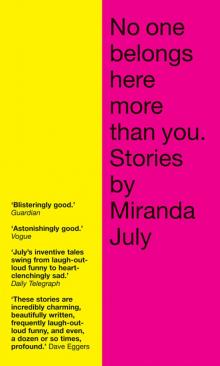- Home
- Miranda July
It Chooses You Page 3
It Chooses You Read online
Page 3
Miranda: I see you have two computers. What do you do on your computers?
Raymond: I email. I email my friends. Sometimes I email my sister if I have a question. And I download music.
Miranda: What kind of music?
Raymond: Dido.
Miranda: She’s cool.
Raymond: It’s too bad Michael Jackson passed away.
Miranda: Yeah.
Raymond: I’m heartbroken because of it.
Miranda: Right before his big tour.
Raymond: That’s my generation.
Miranda: How old are you?
Raymond: I’m thirty-nine.
Miranda: I’m thirty-five.
Raymond: So it’s our generation.
Miranda: Right.
It was a relief, meeting someone whom I had anything at all in common with. Michael and Primila and Pauline had exhausted me with their openness and their quaint inefficiency, but Raymond and I were the same generation; we both knew how to click on things, we both had a version of our name with @ in it. As I left his room I said something like “Maybe I’ll see you around,” as if our generation all liked to congregate at one coffee shop.
But the moment I got back in my car I knew I would never see him again, ever. It suddenly seemed obvious to me that the whole world, and especially Los Angeles, was designed to protect me from these people I was meeting. There was no law against knowing them, but it wouldn’t happen. LA isn’t a walking city, or a subway city, so if someone isn’t in my house or my car we’ll never be together, not even for a moment. And just to be absolutely sure of that, when I leave my car my iPhone escorts me, letting everyone else in the post office know that I’m not really with them, I’m with my own people, who are so hilarious that I can’t help smiling to myself as I text them back.
Not that I was meeting one kind of person though the PennySaver, or that they all sold things for the same reason. Michael was poor, Pauline was lonelier than she was poor, Primila was just old-fashioned. But so far there was one commonality, something so obvious it had taken me a moment to notice. In the process of trying to reassure the people I was calling, I would occasionally mention that I was somewhat established — not a student, but a published writer. Google “Miranda July,” I’d suggest (I do it all day long!). But they weren’t googlers. People who place ads in the print edition of the PennySaver don’t have computers — of course they don’t, or they’d just use Craigslist.
And as I circled and crossed out ads, the newsprint booklet itself began to seem like some vestigial relic. On one future Tuesday the number of computerless people would become too small, and the booklet would simply not arrive. This made me a little anxious, so I called up PennySaver headquarters and asked them if they would be around forever. “The PennySaver in concept will be here forever,” said Loren Dalton, the president of PennySaver USA (which actually serves only California), “but not necessarily in print. That’s why we’ve made pretty heavy investments on the digital side — internet, mobile, we’re getting ready to do some things with the iPad.” But he assured me that nothing would happen right now, not during the recession. The PennySaver has always been strongest when the economy is the weakest; the first issue was printed during the Great Depression in someone’s garage. The word was never trademarked, so the PennySaver Maryland is unaffiliated with PennySaver Florida and PennySaver Nevada. They’ve all started online versions of themselves in the last decade, and the print versions of all of them will be discontinued within the next decade.
So this recession was perhaps the last hurrah for the PennySaver. The internal slogan of the company in 2009 was “Now Is Our Time.” This seemed like a pretty upbeat approach to the crisis. Just claim it! Own it. Dibs on the recession! The PennySaver catered to people for whom ten dollars was worth some trouble — people who saved pennies. Which, right now, was a lot of people.
ANDREW
—
BULLFROG TADPOLES
$2.50 EACH
—
PARAMOUNT
—
Now when friends asked me about how my script was going, I responded with the good news about my new job as a reporter for a newspaper that didn’t exist, interviewing people I found through a soon-to-be-extinct piece of junk mail. And because I was refused by the majority of people I called, the ones I met with did not feel random — we chose each other.
Paramount was completely outside my understanding of LA. I just did what the GPS told me to, and then I was there. It was hotter than where I lived; the blinding new pavement barely concealed the desert. I was much too early, so I drove up and down the streets, past rows of identical new houses. I could picture the man who’d built them, a hammer in one hand and the other hand hitting his forehead for the thousandth time as he stepped back from his newest creation and saw that it was, once again, exactly like the last house he’d built, the one next door. I hate it when I keep having the same bad idea, so I could empathize with him. It seemed like a tough neighborhood for a bullfrog that was just getting started, a tadpole. I hurried back to the address, now late. I’m always late and it’s always because I get there too early.
Andrew turned out to be a seventeen-year-old with three ponds in his backyard. Teenage boys never really made sense to me, and I’ve pretty much avoided them since high school. But Andrew was the one kind of teenage boy I was familiar with: the sweet, curious loner. My brother had also built ponds in high school. Andrew’s ponds were thick with water hyacinths and the special fish that eat mosquito eggs. Actual lily pads floated in the sun and the frogs seemed happy, as suburban frogs go.
Miranda: How’d you make this?
Andrew: I just dug.
Miranda: Did you read about ponds, or how did you figure it out?
Andrew: I didn’t really read about it. People just told me. Everything ended up working out little by little.
Miranda: What do you like about it?
Andrew: I don’t know. It’s just relaxing. Watching all this, it relaxes me a lot.
I nodded, pretending I was relaxed. I watched the sunlight sparkling on the water and practiced mind-body integration for a few seconds by quietly hyperventilating.
Miranda: Had you ever put an ad in the PennySaver before?
Andrew: I never really tried it. It arrives every Wednesday or Thursday. I just started looking at it and said, “Let me try that.” I just wanted to try it out to see. It actually kind of did work out.
Miranda: Oh, really? Have people bought the tadpoles?
Andrew: Yeah. People enjoy them. They were kind of shocked, because nobody could really find a bullfrog tadpole.
Miranda: So the tadpoles are here?
Andrew: Let me take this plant out and you’ll see.
He lifted a pile of dripping plants and scooped up a tadpole in a handful of water.
Miranda: Wow, they’re really getting pretty froglike. I thought they’d be smaller. It must be kind of exciting, because suddenly you’re going to have a lot of — I mean, how quickly is this happening?
Andrew: The transformation?
Miranda: Yeah.
Andrew: It’s pretty fast. I’d say there are a couple of weeks left for this one.
Miranda: Am I picturing the right kind, with the big white thing that’ll make a noise like — well, I’m not gonna make the noise.
Andrew: Yeah.
Miranda: So that’ll be kind of amazing — you’ll have this sound.
Andrew: Everywhere, yeah. It’s really loud.
Miranda: That’ll be kind of surprising in the neighborhood.
Andrew watched carefully as a pigeon tried to decide where to land and then nervously perched next to the pond.
Andrew: Look at the pigeon. I’ve never seen that before. The pond attracts wildlife. It attracts all kinds of animals.
Miranda: Like what other kinds?
Andrew: Lizards too.
Miranda: I guess most of the city must not seem very welcoming for an animal, so this is lik
e a little…
Andrew: Yeah, their habitat.
Miranda: What if, as we stand here, like, lions and antelopes start to come?
Andrew: That’d be crazy.
Miranda: And what do your parents do? Are they at work now?
Andrew: My dad just got laid off from the district. He used to work in Buena Park next to Knott’s Berry Farm. He was a custodian. He got laid off, so now he’s at home. We’re spending more time with him now. My mother, she works at Kaiser.
I was burning in the sun, so we went inside, tiptoeing past the father watching TV and into Andrew’s room. I instinctively shut the door behind us, because what teenager leaves their bedroom door open, ever? But then that seemed weird — I was a total stranger — so I reopened it a crack.
Miranda: Do your parents have ideas of what you should do now that you’ve graduated? Do you have a plan?
Andrew: Go to college, get a good education, get a career started.
Miranda: Where are you going to go?
Andrew: Long Beach. I already registered. I have the booklets and stuff.
Miranda: And what do you want to study?
Andrew: I want to get into engineering with airplanes and stuff, work with the engine or something like that. I don’t know. Something using my hands, like a mechanic.
Miranda: And, besides a job, besides school and then a job, what things do you picture in your future?
Andrew: Picture?
Miranda: What do you imagine?
Andrew: Like in the future?
Miranda: Yeah, anything.
He looked at the ceiling, summoning a vision as if I had asked him to actually see his own future.
Andrew: I probably imagine myself, I guess, being in the forest and stuff like that — in the mountains, something like that, around wildlife.
Miranda: So maybe not here.
Andrew: No, not here.
Something moved in Andrew’s terrarium; I thought it was a turtle but then I looked again.
Miranda: Whoa.
Andrew: Yeah. That’s my pet spider.
Miranda: Is it a tarantula?
Andrew: Yeah. He doesn’t bite. It’s all right.
Miranda: Okay. Good to know there’s a tarantula behind me. Okay, what’s been the happiest time of your life so far?
Andrew: The happiest time? I would have to say it was the graduation party my mom and my father had for me.
Miranda: I bet they were really proud.
Andrew: Yeah. They’re proud. One of my goals was getting out of high school.
Miranda: Was it hard?
Andrew: Well, to me it wasn’t really that hard. I was in Special Ed, so the teachers don’t try to take out effort from you. It’s easy.
Miranda: Was it too easy?
Andrew: Too easy. It could’ve been harder. They don’t try to teach you, because they think you won’t be able to pick up the information they’re giving you.
Miranda: Do you know why you’re in Special Ed?
Andrew: No. I’ve been in it since 2000.
Miranda: So… since you were eight.
Andrew: Yeah. They just gave me my paperwork, and on the paper it says it’s because I’m slow in remembering.
Miranda: Is that true?
Andrew: It says supposedly when I’m in class I’m daydreaming. I guess the teacher must think that because I don’t really talk to people in my classes, because I don’t know them. I just sit there and do my work and I don’t talk to nobody. I guess the teacher must think I daydream because I’m not interacting with other people.
Miranda: What do you wish you’d learned more about?
Andrew: Probably science. In my science class we weren’t able to do experiments. If you give some of the Special Ed kids a knife or something, they’ll play around, and I guess they didn’t really trust all of us so they’d rather not give us materials to be able to do experiments and stuff. I kind of got mad at that part. We weren’t able to do experiments where the other kids would do projects and stuff. We never had the chance to do that.
Miranda: And you would’ve been so good at biology and —
Andrew: All that stuff. It’s crazy.
Miranda: It’s making me mad.
Andrew: It made me mad.
Miranda: Not many people your age build a whole pond and keep everything alive. I wonder how much your college will look at those papers or if you can get kind of a fresh start.
Andrew: They’re going to look at them. My counselor, she told me to turn in all that information to Special Ed services or something like that.
Miranda: It seems like it could be just as easy to be a park ranger or something like that as to work on airplanes — I mean, if you had the choice.
Andrew: I don’t know, because people say it’s hard. And I’m not really good with all that stuff. When I want to do something I want to know that I can accomplish it, but if I start thinking that in the long run it’s going to be super hard, I kind of take a step back.
Miranda: Well, especially if you’ve had people telling you that you’re not good at that, it’s a hard thing to learn to finish. At least you’re almost an adult — there are some good things about that. In high school you don’t have any real rights, but at least in college…
Andrew: Yeah. It’s all on me now.
It was tempting to jump in with some advice — I was about two seconds away from offering him an internship at my brother’s workplace, restoring wetlands. But it seemed be a tendency of mine to look for each person’s problem and then overlook all the other things about them. So I tried to see what else he was, besides lost in the system. Andrew was a little angry, but more than that, he was proud. So I changed my approach; I said the opposite of what I felt, and it was more true.
Miranda: So we caught you at a kind of exciting time in your life.
Andrew: Yeah, pretty much at a good time.
Miranda: This is corny, but you’re kind of like the tadpole about to transform.
Andrew: Yeah. It’s true.
Miranda: You’re one of the big ones that have only a couple weeks left.
Andrew: You could say that, a tadpole.
For a moment I could feel time the way he felt it — it was endless. It didn’t really matter that his dreams of wildlife were in the opposite direction from the airplane hangar where he was headed, because there was time for multiple lives. Everything could still happen, so no decision could be very wrong.
That was exactly the opposite of how I was feeling now, at thirty-five. I drove home from Paramount feeling ancient, like the characters in my script
Sophie: We’ll be forty in five years.
Jason: Forty is almost fifty, and after fifty the rest is just loose change.
Sophie: Loose change?
Jason: Like not quite enough to get anything you really want.
I knew this wasn’t really true, but that was the paralyzing sensation. There wasn’t time to make mistakes anymore, or to do things without knowing why. And each thing I made had to be more impossibly challenging than the last, which was hair-raising, since I had been out of my depths from the very start.
The first thing I ever made professionally — that is, for the ostensible public — was a play about my correspondence with a man in prison. I started writing to Franko C. Jones when I was fourteen. I’d found his address in (where else?) the classifieds, in a section that doesn’t seem to exist anymore called “Prison Pen Pals.” When I was younger, my dad had read The Minds of Billy Milligan to me before bed, the true story of a robber and rapist with multiple personality disorder (my father’s preference was to read me books that he himself was interested in). So my sympathy for imprisoned men was sort of a family tradition; I may even have written my first letter to Franko because I wanted to do something my dad would think was interesting. But then I kept writing to him for three years, every week.
The gap between a thirty-eight-year-old murderer serving his eighteenth year in Florence, Arizona, and
a sixteen-year-old prep-school student in Berkeley, California, is lyrical in scale, like the size of the ocean or outer space. Bridging it seemed like one of the few things I could do that might be holy or transcendent. I’ve been trying for so long now, for decades, to lift the lid a little bit, to see under the edge of life and somehow catch it in the act —“it” being not God (because the word God asks a question and then answers it before there is any chance to wonder) but something along those lines. We wrote about grades, prison riots (Franko tape-recorded the sounds of one), my friends (Johanna, Jenni), his friends (Lefty, One-Eye), and everything else in our lives, except for sex, which I said at the start was off-limits.
I wrote the play because I couldn’t explain the relationship; conversations about it ended badly and I longed to be understood on a grand scale. I put a casting call in the free weekly newspaper, and I held auditions in a reggae club. I cast a drug-and-alcohol counselor in his thirties as Franko, and the character based on me was played by a Latina woman in her early twenties named Xotchil. (I thought I would be taken more seriously as a director if I didn’t also act in it — something I keep forgetting these days.) We practiced in my attic and performed the play, The Lifers, at 924 Gilman Street, a punk club. I rented chairs from a church and sat in them with my friends and family and my family’s friends and a few bewildered punk rockers. Together we watched this enactment of my improbable friendship and its clumsy spiritual yearning. I was so electrified with simultaneous shame and pride that two-thirds of the way through the play I got out of my seat and crept up to the side of the stage. I’m not sure what I planned to do from there — perhaps stop the show or redirect it as it happened. The drug-and-alcohol counselor gave me a hard look from the stage and I slunk back to my seat. I would simply have to endure it.
BEVERLY
—
BENGAL LEOPARD BABY CALL FOR PRICES
—

 No One Belongs Here More Than You
No One Belongs Here More Than You It Chooses You
It Chooses You The First Bad Man
The First Bad Man The First Bad Man: A Novel
The First Bad Man: A Novel